This story is part of an issue about abuse, harassment, and sexism in the theatre. You can read other #TheatreToo stories here.
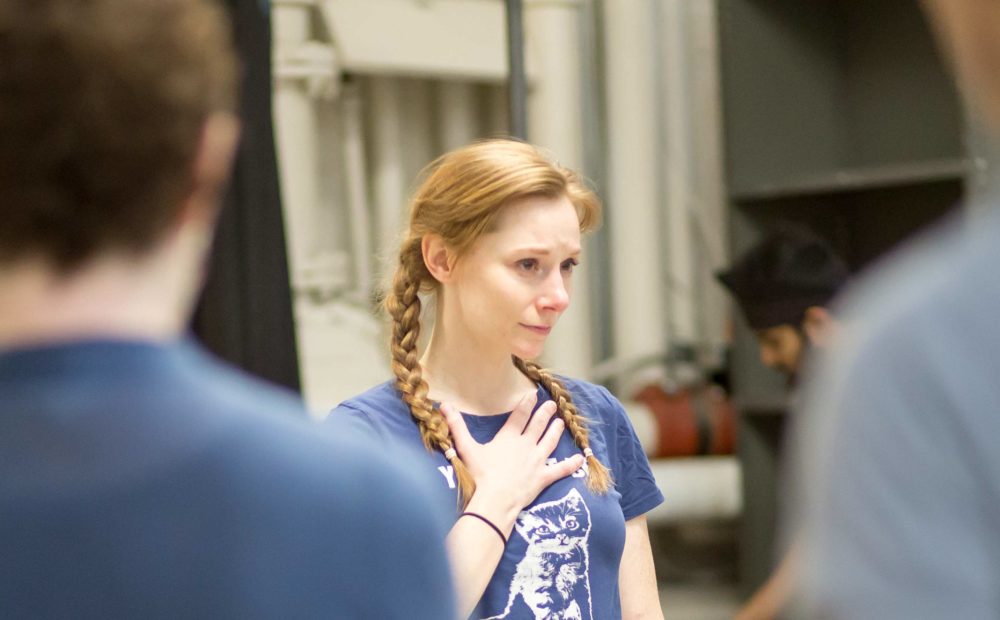
Tell the Story
There’s a quote Emily Trask likes to refer back to. It’s by Leslie Marmon Silko, from her novel Ceremony. Trask read it when she was a young actor, and has kept it close throughout her 16-year career. She quoted it to me over the phone from memory:
I will tell you something about stories…
They aren’t just entertainment. Don’t be fooled.
They are all we have, you see,
all we have to fight off illness and death.
You don’t have anything
if you don’t have the stories.
Since telling her own story in November to the Houston Chronicle—a story of abuse and bullying at the hands of Gregory Boyd, then artistic director of the Alley Theatre, which led to a public outcry and a company-wide investigation—Silko’s quote has taken on new meaning for Trask.
“I really believe that telling stories, even the ones that are really hard to tell, even the ones that have a cost—I believe that is deep medicine, both personally and culturally,” she said, her voice thick with emotion. “I knew that then. Now it feels even more true.”
Trask wouldn’t call herself a “hero” or “brave” for quitting the Alley Theatre (“my dream job”), then going public about her experiences there (she reported verbal abuse and inappropriate touching). It was a necessity, not only for herself but for other actors, so that they don’t walk into an unsafe work environment, as she did. “I looked into filing a civil lawsuit, me and two other survivors,” she said. “But ultimately we decided it was more important that it became public than if we got compensated for it.”
Trask said she knew that speaking out would negatively affect her career. Since January, when the Chronicle article broke, she’s been laying low; she deleted her social media accounts and moved to Philadelphia. When we spoke on the phone, she was getting ready to move again, to Santa Maria, Calif., to take a full-time position at the Pacific Conservatory of the Performing Arts.
This is a fortuitous turn for Trask, who saw acting opportunities dry up after the Chronicle article. Before she’d been a working actor, having played a lead in Shakespeare in Love at Baltimore Center Stage; at the Alley she’d been a company member for two years. After the article broke, she found herself at auditions where casting directors would recognize her name from the news reports.
“It’s not always negative, but it’s usually a kind of withdrawing,” she said. “It’s like the world knowing a deeply personal thing about you before they even meet you.” To get by for the past six months, she took a minimum-wage job. She also accrued significant debt (“more than my grad school debt”); she was itinerant for the 10 months between leaving Houston and settling in Philadelphia. When she saw the news that Boyd had received a $383,000 severance for retiring, “it was hard,” she said softly.
Though Boyd is no longer employed at the Alley, Trask admitted that she still has nightmares about “being attacked” by him. The entire experience has left her confidence “in limbo.” What’s helped pull her out of purgatory is the opportunity to teach a young group of artists at PCPA.
“Getting to teach and work with the next generations of theatre artists and help them develop a kind of self-advocacy and good operating practices, and to negotiate that inherent grey area, that even on the good days this field treads in—that’s what’s keeping me going,” she said.
Based on her own experiences, she’s hoping to teach young actors how to advocate for themselves if they’re ever in a hostile environment, and “how to deal with people when they might not be using their best operating practices, and they’re not being professional,” she said. “It starts with a kind of self-knowledge and realizing—especially as a woman in the theatre, where you’re a dime a dozen and there’s all kinds of social BS put on you—that your voice counts, that you’re worth something, that your artistic thoughts are valid.” Let the stories be told, and heard.
—Diep Tran
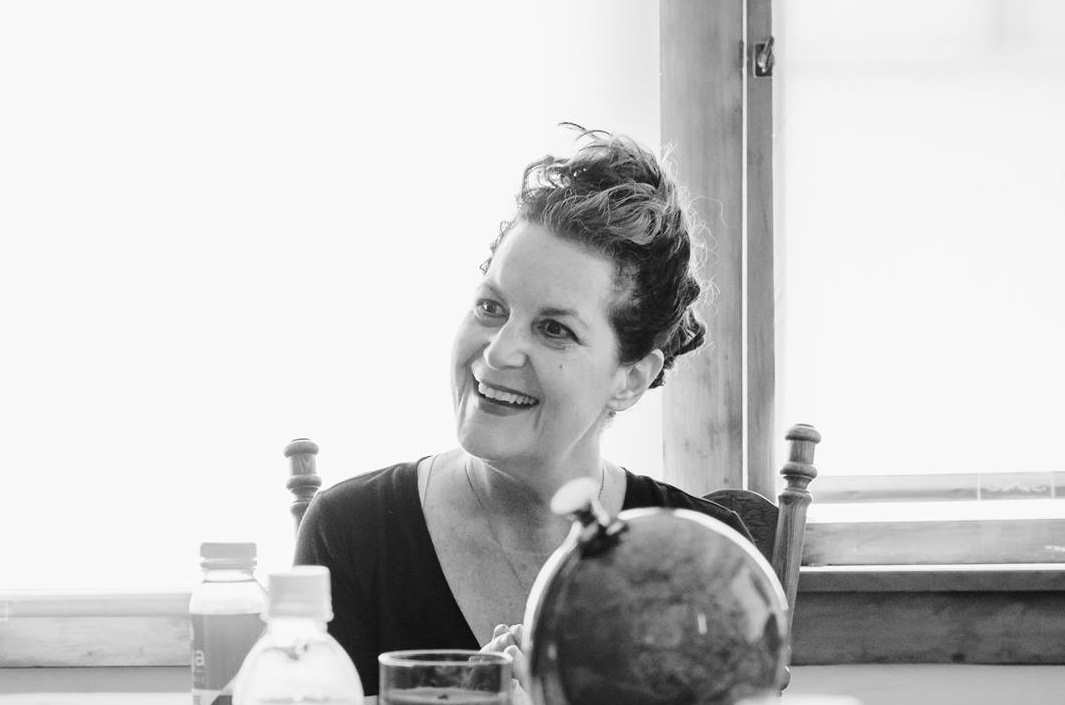
The Body Remembers
Each week when theatre director Kim Rubinstein goes to acupuncture and physical therapy, her body reminds her of something she’d rather not recall: that Gordon Edelstein, the former artistic director of Long Wharf Theatre, harassed and physically assaulted her multiple times between 2003 and 2007, when she was associate artistic director at the theatre.
“I tend to take emotional things very physically in my body,” Rubinstein said by phone from San Diego, where she teaches acting and directing at the University of California-San Diego. “I am not able to sustain a physical relationship. If I try to have sex with anybody, I disassociate.” She estimates that to date, she’s spent around $100,000 on physical and trauma therapy.
Rubinstein said she’s frustrated with the way even many well-meaning #MeToo narratives are told. “The focus is still on the perpetrator and not on the people that this happens to,” she said. “How about the fact that the women’s careers have been altered, if not ruined?” Rubinstein recalled that in 2007, even after Edelstein’s abuse, her directing career was blossoming. But when she reported Edelstein to the board of the Long Wharf and they chose not to fire him, he seemed to retaliate by no longer hiring her to direct at the theatre. She described retreating into herself, not wanting to socialize with other theatre people, “to get smaller and smaller and smaller.”
When UCSD came knocking, she accepted the teaching position they offered and moved West—as she described it, “into exile.” Not that she’s been idle: She’s directed at such theatres as the Old Globe, San Diego Rep, and the Odyssey in Los Angeles.
Last fall, after the Harvey Weinstein news broke, Rubinstein realized she couldn’t stay quiet.
“It felt like a jar on the windowsill and water was going into it and it’s overflowing,” she explained. So she told her story to The New York Times, which also reported allegations from other women in a January article that got Edelstein promptly fired from his job after 16 years.
Has going public helped Rubinstein rebuild her confidence? She responded with a wry chuckle. “I don’t even know if it is rebuilt,” she said. “It’s different.”
One happy discovery: With the secret weight lifted off her, she feels that her own artistry has deepened.
“My work as a director has leapt forward in a way I didn’t expect,” she explained. “My voice is clearer, as if free at last.” She recently directed How to Defend Yourself at UCSD, a play by Lily Padilla about sexual assault. Instead of being triggering for Rubinstein, it ended up being a “fascinating experience,” she said, allowing her to examine the subject from all points of view.
“What I’ve been holding in my body is being released through the work, and through my work with students in the classroom,” Rubinstein said, audibly welling up.
As she traces her own trauma and its effects on her artistry, she also makes sure that her students have the right tools to safely tap into their own vulnerability and personal experiences without feeling exploited.
“In my classes, I’ve spent much more time with the students helping them to stand in their name, in their vision, stand on their feet, find stability, find orientation,” she explained. “So we can go real far into vulnerable places and passions, and the depths of human experience and conflict. But I am spending equal amount of time teaching them to come back and how to stand in the world with clear eyes and a sense of their own voice.”
—Diep Tran

Power and Agency
In June of 2016, the Chicago Reader published an explosive article by Aimee Levitt and Christopher Piatt, outlining years of abuse by Profiles Theatre artistic director Darrell W. Cox. It confirmed rumors that had floated around Chicago theatre’s whisper networks for quite some time. Within a week of the story breaking, Profiles shut down.
But for the women who went on the record for the Reader, the way forward since then hasn’t been so clear. One of those women, Claire Wellin, spoke recently about the aftermath of the story, and about the changes she’d still like to see at the institutional level.
Wellin acted in Profiles’ 2010 production of Tracy Letts’s Killer Joe, which won critical acclaim and awards for its realistic violence. But as the Reader stories of Cox’s real-life physical, sexual, and psychological abuse of his fellow actors on that and other productions revealed, the boundaries between staged and actual abuse at Profiles were regularly crossed.
Wellin’s path out of that experience took her to New York in 2013 to join the cast of Broadway’s Once. She also did the show’s national tour for two years, but these days she focuses more on writing and performing her own music, including in the “ghost folk” band Youth in a Roman Field and with indie rockers San Fermin.
“As an actor, you have to be okay with not having agency in your own career and life,” Wellin said philosophically. “Some people have a passion and a talent that is so wonderful that they want to do what it takes to get to that place where you do have that power. But I realized that I didn’t have that, nor did I like waiting for people to cast me or take a chance on me.”
The Reader’s Profiles exposé hit more than a year before the wave of high-profile stories about sexual abuse in Hollywood and beyond. Said Wellin, “I still find myself, when I hear about a news story specifically about #MeToo and sexual harassment, reacting with rage.”
But that rage is balanced with Wellin’s desire for greater accountability at theatre institutions. She refers to an incident recounted in the Reader piece—a closed-door meeting with Actors’ Equity in Chicago in April 2015—that left several of the participants, including friends of Wellin’s, feeling unheard. “I had friends in New York who read the Reader article and who asked me, ‘Why didn’t you go to Equity?’ We did go to Equity,” she said. Wellin was particularly disturbed that Cox was working with underage actors in Profiles’ 2016 production of Jez Butterworth’s Jerusalem—the theatre’s final show, as it turned out—even after that meeting with Equity. (Equity spokeswoman Maria Somma declined to comment for the Reader article, which noted that many of the incidents occurred before Profiles became an Equity member.)
“Sometimes I think the Chicago model, the ensemble model, so celebrated in other places, at a certain point just becomes a power play,” said Wellin. “It leads me to be skeptical, because it turns out that most of the people who are in positions of power are white men.”
She added, “This relates to economics and how we value art in the United States and how creative people get paid. You’re more likely to be put in positions, more so than in other fields, where you’re making sacrifices that include moral and safety sacrifices to ‘make it.’”
Within that framework, Wellin thinks the way forward involves a combination of “encouraging independence, empathy, and self-reflection for artists, and also holding people’s feet to the fire who have power in these institutions.” But she also said, “We need to leave room for people to learn and change and grow along the curve without shutting down the people who are trying to do better.”
So what’s the starting point? Referencing the recent accusations of abuse against former New York attorney general Eric Schneiderman, Wellin said, “Believe the women. No survivor gets anything from coming forward. If we change the system, we have to change it on a very personal level. Speak up.”
—Kerry Reid
An Advocate Awakened
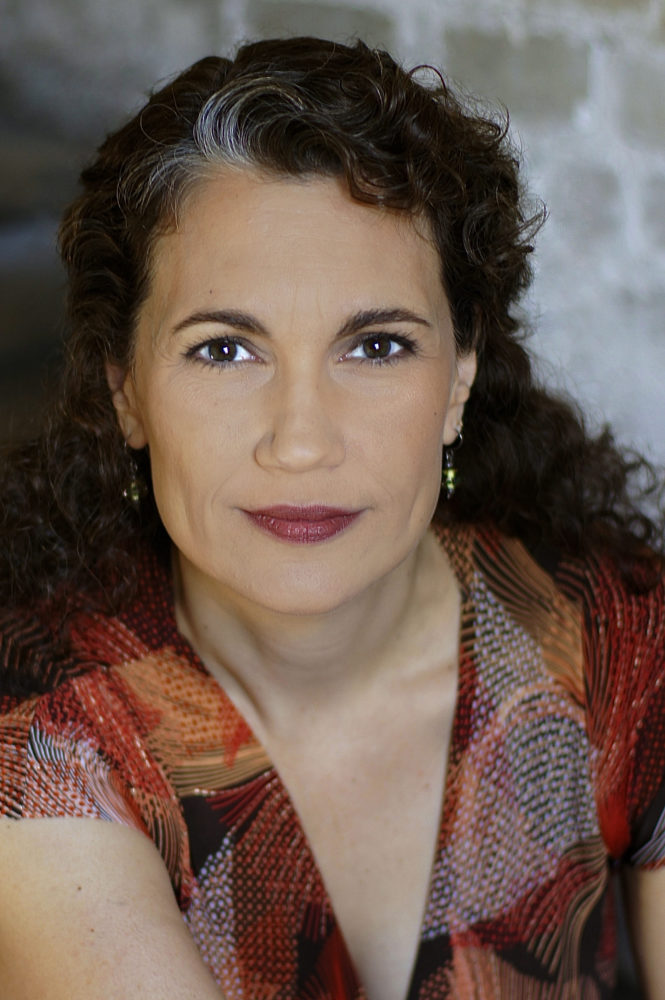
Laura Stearns Adams is wig master at the Guthrie Theater in Minneapolis. When we met she had just wrapped up creating wigs for West Side Story and was turning her attention to The Legend of Georgia McBride, which presented her with the quandary of how to get an actor into full drag hair and makeup in two minutes flat. Pro tip: Magnetic eyelashes would play a huge role.
Stearns Adams was drawn to the world of theatre from a very early age. When she was 11, she saw a production of Good Morning, Mr. Tilly at the nearby Children’s Theatre Company (CTC). “‘I wanna be up there,’” she remembered thinking. “‘That’s all I want to do.’”
By the time she turned 15, Stearns Adams was enrolled in CTC’s conservatory school, where she has alleged that she was sexually assaulted by Jason McLean, then a 28-year-old instructor. In December 2015, 32 years later, she filed a lawsuit against McLean.
Stearns Adams said she felt encouraged to go public because of Minnesota’s Child Victims Act, which gives adults over the age of 24 who experienced abuse as children a three-year window to sue for damages in a civil court. After Stearns Adams shared her story, four more women came forward and filed their own lawsuits against McLean. CTC has since been participating in a mediation process and has recently instituted more stringent rules around interactions between adults and children.
Meanwhile, McLean sold off his Minneapolis properties and fled to Mexico, where he reportedly bought a property there valued at around $1.5 million. Last year a judge entered a “default judgment” against McLean in the amount of $2.5 million after he failed to appear for court dates.
“There’s no way he’s ever going to own this,” said Stearns Adams. “But that doesn’t make me want to stop.”
Sharing her story with so many people has “awoken the advocate” in her. “Just keep talking,” she advises others, whether they’re personally experiencing harassment or assault or witnessing it. “Bystanders need to feel empowered to step in and advocate.”
While Stearns Adams recognizes that harassment and assault happen in every industry, at all levels, she sees theatre as especially prone to uncertain boundaries. “We will stretch ourselves in ways that other people don’t in other industries,” she said. She added that nowhere are we formally taught how to maintain and respect boundaries, or that we even can and should maintain certain boundaries, whether physical, mental, or emotional.
To move forward and maintain the momentum of the #MeToo movement, Stearns Adams said she would like to see more institutions having these conversations and employing practices that promote everyone’s safety, autonomy, and well-being. The Guthrie has instituted such dialogues, in part in response to internal complaints (see below), and Stearns Adams recently participated in a similar conversation with the Guthrie’s BFA acting students.
After years of silence, Stearns Adams now feels she’s moved into the light. “I feel taller,” she said. “I feel empowered. I feel like I have the right to be out loud.”
—Theresa J. Beckhusen
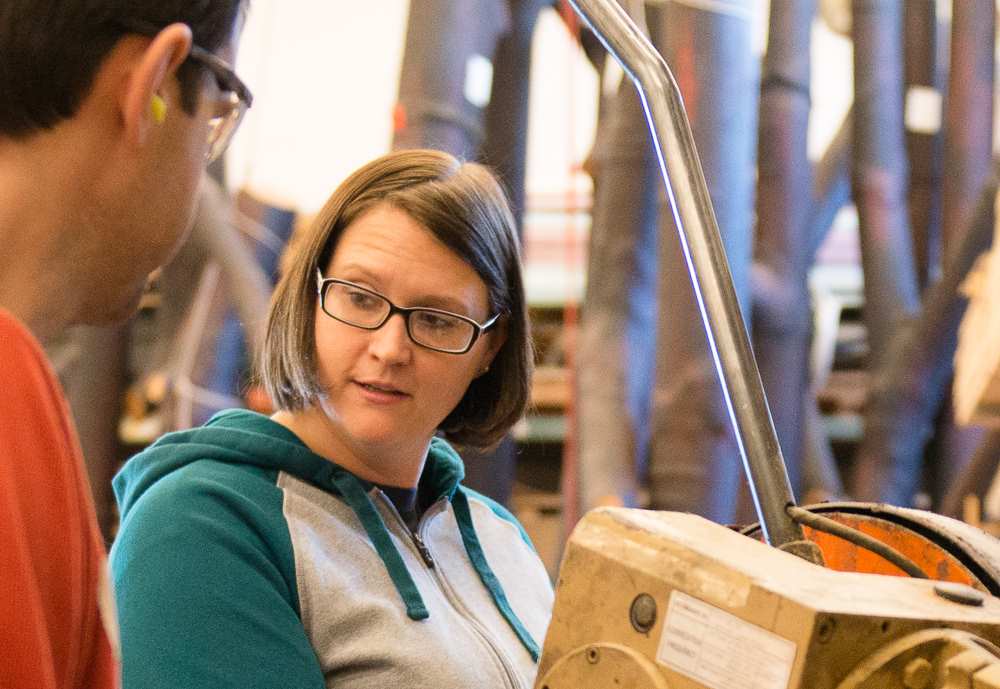
Building and Rebuilding
Molly Diers has known that she wanted to make a life in the theatre since she was 12. “I was an Andrew Lloyd Webber dork when I was a kid,” she recalled. “There’s something about live theatre that touches a part of my soul and I want to be a part of it.” After 10 years freelancing as a theatre carpenter in her hometown of Minneapolis, she thought she’d finally made it when she landed a position at the town’s flagship theatre, the Guthrie. “It really was my dream job.”
But the dream didn’t match reality. In January, after years of filing unresolved complaints about harassment by male coworkers at the scene shop, Diers resigned and wrote a long Facebook post charging her supervisor, the theatre’s technical director, Josh Peklo, with “breed[ing] a sexist culture.”
The theatre soon launched a company-wide investigation, in which Diers participated, and recently released findings which found instances of sexist comments and inappropriate touching, though it didn’t substantiate all of Diers’s allegations. Diers also filed formal charges with Minneapolis Department of Civil Rights and with the National Labor Relations Board.
In a recent phone conversation, Diers sounded somber but resolute about her ongoing tussle with the Guthrie. “I know some people in the building have said that I’m in it for the money,” she says. “I didn’t ask for money.” Hiring a lawyer and being a freelancer is “so much harder” than working full-time at the Guthrie. Instead, she said, “A settlement is rehiring me.”
In the meantime, Diers continues to freelance, but she admitted that it’s been “rough.” A job at the Guthrie means a living wage and health insurance, while “most small theatres pay $16-$18 an hour. I am 39 and I have a house and a mortgage. How do you take that step backward in your career?”
She said she’s thinking of leaving theatre; in February she was a builder for the set of the Super Bowl halftime show. Does this mean she regrets speaking out? “It depends on the day,” she said with a sigh. “Sometimes I’m like, I never should have quit or said anything. Other days I feel more empowered and more like change is a real possibility. It’s just been a roller coaster up and down.” She added that having supportive friends and family has helped.
Her biggest regret will be if there is no change at the Guthrie, and women continue to feel silenced there. That was one of the reasons she spoke up, she said; she felt secure in her seniority at the company, and wanted to make sure her younger female colleagues were heard. “I don’t want other women to give up their careers,” she says. “I have an inbox full of messages about people who quit theatre. Women and people of color walk away from it all the time because it’s not inclusive.”
To her, what would foster better company culture is simple: for men to listen to women with openness. “Not all men intend to be creepy,” she said. “But if somebody says, ‘Don’t say this,’ and they’re like, ‘I’m going to say what I want,’ then we’ve got a problem. If they go, ‘Sorry, you’re right, I shouldn’t have said that,’ we can work on it. I don’t expect men to be perfect when they walk through the building. But if they’re receptive to changing, great! We’ll change the culture together.”
—Diep Tran
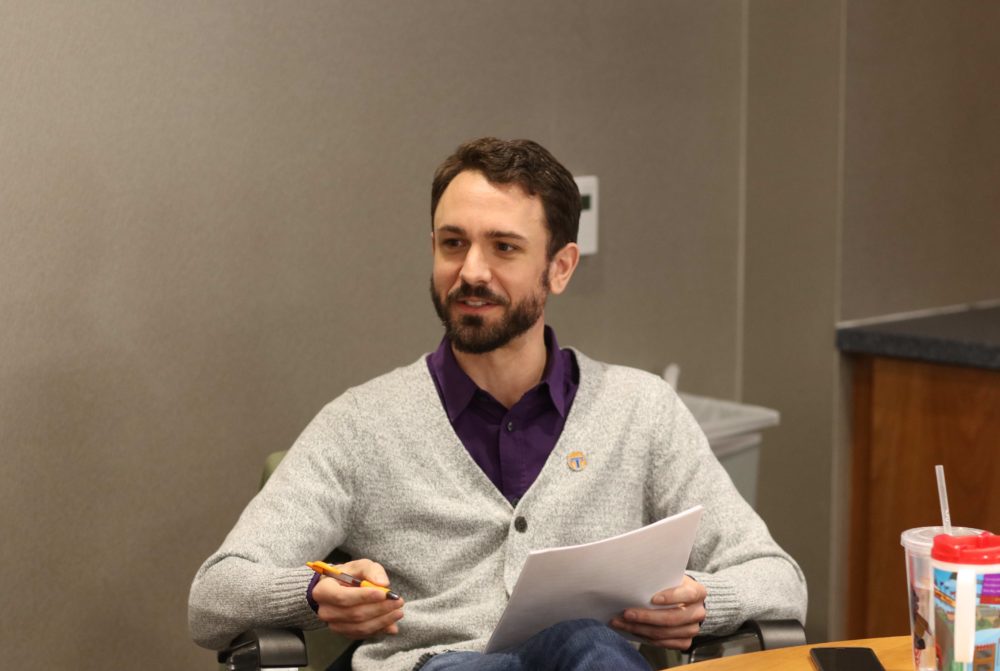
Paying It Forward
Though it may seem counterintuitive for its small-town setting in central Decatur, Ill., Millikin University “is really a school that prioritizes the performing arts,” said Tom Robson, associate professor of theatre and dance at the school, where he teaches theatre history, dramatic literature, directing, and playwriting.
Theatre is, in fact, the largest department on Millikin’s campus, with majors comprising around 15 percent of the student body—about 270 this fall out of 1,700 total undergrads. “It’s very, very common to be walking down a hallway and see somebody practicing a dance combination outside their math classroom. It’s just kind of what we are,” said Robson, who’s been on the faculty at Millikin since 2011. “It’s nice, when universities nationwide are really cutting their arts programming, to be someplace that’s investing in it.”
Robson, 38, grew up in the Philadelphia area, where he followed his interest in theatre into a kids’ camp at the venerable People’s Light & Theatre. After attending as a camper, he was invited to audition for A Christmas Carol and ended up playing the young Ebenezer Scrooge. “They used me for three years on Carol and one year on Peter Pan,” Robson recalled. “When you’re in a room at 11, 12, 13 years old with 20 Equity actors, you learn a lot. That was a major life experience for me.”
Robson went on to major in theatre at Grinnell College in Iowa, where he realized that “acting was not my strongest suit.” Instead he discovered passions for theatre history and dramaturgy that he would later continue to follow in academia. “I did some work as an undergrad with some weird, obscure plays that I found really fascinating and wanted to spend more time getting to explore those,” he said. “I was fairly certain that there weren’t a lot of professional theatre environments where that weird two-hander from New Zealand was going to find a home, but I can explore that in the classroom if I want to.”
But after graduating from Grinnell in 2002, Robson wanted to gain some real world experience before pursuing his master’s and Ph.D. (both of which he later completed at Indiana University). He encourages his current students to do the same: “Don’t go straight into grad school. Take a few years to learn how to be a human being.”
It was while working professionally in Chicago that he had the experience he described in a string of tweets on Nov. 2 of last year: In 2003, he was an intern at Writers Theatre in Glencoe, Ill., serving as assistant director and dramaturg on a production of Crime and Punishment. Throughout the rehearsal process, Robson alleged, he experienced sexual harassment by Writers founder and artistic director Michael Halberstam in the form of inappropriate comments and touching.
Robson’s Twitter thread spurred Writers’ board of directors to hire an independent investigator; Halberstam agreed to undergo “compliance training,” and the board declared the matter closed on Nov. 30. Robson has declined to make further public comment beyond his initial tweets, which he prefaced then by writing, “Literally never been more scared to post something in my life.”
In our conversation in late June, he said only that “the last eight months have been challenging, and overwhelming—in ways both difficult and really wonderful.” Robson said he hopes to leave the industry in a better state for his students, and to inspire them the way others inspired his young self. “One of the very first things I did after I defended my doctorate is I found my old director from Christmas Carol, Peter DeLaurier, through Facebook,” he said. “I sent him a message saying, I don’t even know if you remember me, but 20 years ago you cast me in A Christmas Carol, and I just earned a Ph.D. in theatre, and it’s because of you.”
—Kris Vire


